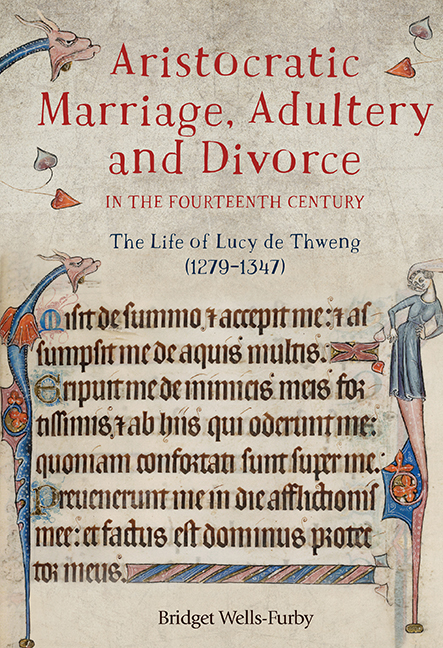 Aristocratic Marriage, Adultery and Divorce in the Fourteenth Century
Aristocratic Marriage, Adultery and Divorce in the Fourteenth Century Book contents
- Frontmatter
- Contents
- List of Illustrations
- Acknowledgements
- List of Abbreviations
- Note on the Text
- Introduction
- Map
- 1 Birth and Family; Inheritance and Disinheritance
- 2 Wardship and First Marriage
- 3 Separation and Divorce
- 4 Adultery and Fornication
- 5 Second Marriage
- 6 Widowhood
- 7 Third Marriage
- 8 Death
- Summary and Conclusions
- Bibliography
- Index
4 - Adultery and Fornication
Published online by Cambridge University Press: 04 April 2019
- Frontmatter
- Contents
- List of Illustrations
- Acknowledgements
- List of Abbreviations
- Note on the Text
- Introduction
- Map
- 1 Birth and Family; Inheritance and Disinheritance
- 2 Wardship and First Marriage
- 3 Separation and Divorce
- 4 Adultery and Fornication
- 5 Second Marriage
- 6 Widowhood
- 7 Third Marriage
- 8 Death
- Summary and Conclusions
- Bibliography
- Index
Summary
As with Lucy's decision to divorce Latimer, the accusation of adultery must be considered within the wider context of theory and practice. It becomes clear that adultery was far from uncommon in landholding families and, moreover, that the circumstances of Lucy's adultery greatly mollify the scandalous implications.
According to the church view, the only legitimate forum for sex was between people who were married to each other. Sex between two people of whom one or both were married to someone else was the sin of adultery, while sex between people who were not married to each other but not married to anyone else was the sin of fornication. Both men and women of landholding rank engaged in both these forms of extra-marital sex, and the penalties imposed by the church on those convicted were either cash fines, of varying severity, or physical, public and humiliating penances. The church was reasonably even-handed, viewing adultery sternly whether the erring partner was husband or wife, but in secular terms adultery by a wife was far more serious than adultery by a husband.
Adultery by husbands was commonplace and wives might tolerate it, or they might not. The level of expected toleration is illustrated by the 1377 will of John Constable of Holme-on-Spalding-Moor who left small cash sums to his two illegitimate sons and their mother, and, having appointed his wife Margaret as one of his executors, expected her to oversee the payments to them. Richard Scot, when summoned before a church court in Northumberland, admitted his adultery with five other women and also to a number of illegitimate children all of whom were looked after by his wife, also Margaret. She eventually applied for a divorce a mensa et thoro; as well as her husband's adultery she was also subjected to physical abuse by him, and it seems likely that wives generally left their husbands not for their adultery alone but when it was exacerbated by violence. It has been seen (Chapter 3) that Alice le Bacheler left her husband and went back to her parents because of his adultery with a concubine and because of the danger to herself.
- Type
- Chapter
- Information
- Aristocratic Marriage, Adultery and Divorce in the Fourteenth CenturyThe Life of Lucy de Thweng (1279–1347), pp. 100 - 130Publisher: Boydell & BrewerPrint publication year: 2019


